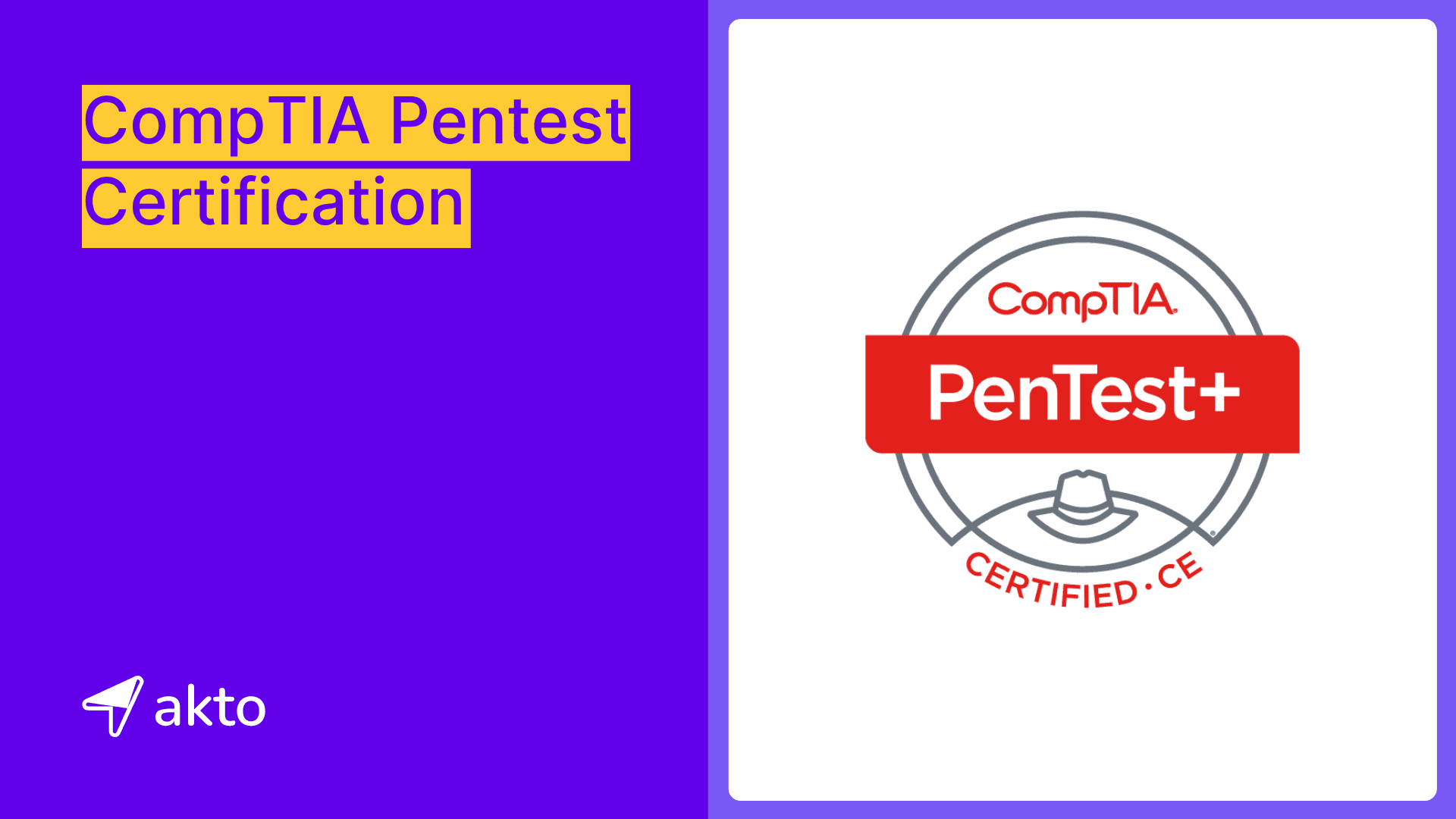CompTIA Pentest+ Certification

Insha
Nov 8, 2024
The CompTIA PenTest+ certification is a globally recognized certification for cybersecurity professionals, focusing on penetration testing and vulnerability assessment. It validates the skills needed to identify, exploit, report, and manage network security weaknesses.
This blog post provides a comprehensive guide to the CompTIA Pentest+ certification, its significance, and how to approach the exam.
What is CompTIA Pentest+ Certification?
CompTIA PenTest+ is a certification that validates the skills required to perform penetration testing and vulnerability assessment. It focuses on practical techniques for assessing an organization's security posture, identifying vulnerabilities, and effectively reporting findings.
The certification covers various aspects such as planning and scoping, legal and compliance issues, attacks and exploits, and penetration testing tools and methodologies, making it ideal for cybersecurity professionals looking to advance their ethical hacking and pen testing expertise.
Why does Certification Matter?
Certification matters because it validates skills, enhances credibility, and opens up new career opportunities in the competitive field of cybersecurity.
Validation of Skills
Certification serves as concrete proof of a professional’s skills and knowledge in a particular domain. It shows that the individual has met specific standards and mastered essential topics relevant to the role. Employers value this validation because it helps them assess competence and ensures that the person has the technical capabilities required for effective performance.
Career Advancement
Certifications can significantly boost career growth, as many employers prioritize certified individuals when hiring for specific roles, promoting employees, or considering salary increases. Holding relevant certifications can distinguish professionals in the job market, opening new career paths and advancing them in their current roles by demonstrating a commitment to the field.
Industry Standards
Certifications often align closely with industry standards and recognized best practices, ensuring that professionals have up-to-date skills and are trained in the latest methodologies. They reflect current trends and technologies, equipping certified professionals with techniques and practices that meet industry requirements, thereby improving their ability to perform effectively and securely.
Credibility
Being certified adds a layer of credibility and trustworthiness to a professional's profile. It instills confidence in employers, clients, and colleagues, reassuring them of the certified individual’s qualifications. This recognition can lead to more responsibilities, trust in leadership, and opportunities to work on critical projects where proven expertise is required.
Continuous Learning
Certifications often require ongoing education and recertification to maintain their validity. This commitment to continual learning helps security professionals stay informed of emerging trends, tools, and techniques within their field. Such ongoing development encourages a culture of learning and ensures that professionals are always improving and expanding their skill sets.
Global Recognition
Many certifications are recognized across different countries and industries, offering professionals the flexibility to work internationally. Global recognition helps certified individuals to be competitive in the global market, allowing for career mobility and opening up opportunities to work with a diverse set of clients and organizations worldwide.
What Does the Exam Cover?
The CompTIA PenTest+ exam covers a broad range of topics, including planning and scoping a penetration test, understanding legal and compliance requirements, vulnerability scanning, and analyzing results.
It tests knowledge in attacks and exploits, focusing on network, wireless, web, and application-based vulnerabilities. Additionally, the exam includes practical skills in conducting penetration tests, gathering information, exploiting vulnerabilities, reporting findings, and suggesting remediation strategies. It aims to ensure that candidates are well-equipped with both theoretical knowledge and hands-on skills needed for penetration testing.
How to Approach the Exam?
Approaching the CompTIA Pentest+ exam requires a comprehensive strategy due to its technical nature and emphasis on practical skills. Here's how security professionals can effectively approach it:
Understand the Exam Objectives
Thoroughly understand the CompTIA Pentest+ exam objectives as outlined by CompTIA. Knowing the topics and skills to be tested is essential. List all exam domains and ensure your comfort with each section to target your study effectively and avoid surprises on the test day.
Review Study Materials
Make use of official study materials provided by CompTIA, such as study guides, practice exams, and online resources. Additionally, broaden the preparation by using third-party resources like books, online courses, and video tutorials. This combination ensures that security professionals cover all topics and reinforces key concepts from multiple angles.
Hands-On Practice
Since pentesting is a practical skill, hands-on practice is crucial. Set up a virtual lab environment using platforms like VirtualBox or VMware to practice various pentesting techniques, tools, and methodologies.
Focus on areas like network reconnaissance, vulnerability assessment, exploitation, post-exploitation, and reporting. This hands-on experience will enhance practical skills and confidence.
Master Pentesting Tools
Familiarize yourself with widely used pentesting tools such as Nmap, Metasploit, Wireshark, and Burp Suite. Understanding how to effectively use these tools for scanning, enumeration, exploitation, and traffic analysis is crucial. Practice with these tools in the virtual lab to gain familiarity and build muscle memory for different scenarios.
Stay Updated
Pentesting techniques and tools are constantly evolving, so staying up-to-date is key. Follow reputable security blogs, forums, and conferences to stay informed about the latest threats, vulnerabilities, and industry trends. Keeping the current knowledge ensures you're prepared for emerging topics that may appear on the exam.
Take Practice Exams
Taking practice exams is an excellent way to test your knowledge and identify any gaps in your understanding. Use these exams to gauge the readiness for the real test and focus on weak areas. Practice exams also help security professionals become familiar with the format and types of questions they’ll face.
Time Management
Effective time management is crucial during the exam. Read each question carefully, allocate time-based on the section's weight, and ensure you don't spend too much time on any single question. Practice managing time in advance so you can complete the exam efficiently and confidently.
Review and Reflect
After completing practice tests, review the answers thoroughly. Understand the reasons behind any mistakes and focus on strengthening those weak areas. Reflect on what you’ve learned from each practice exam to improve the approach and ensure you fully grasp the concepts before the actual exam.
Simulate Exam Conditions
Recreate the exam environment as closely as possible during practice sessions. Time yourself, avoid distractions and study in a quiet space. Simulating exam conditions helps security professionals build the discipline needed for the actual test and reduces anxiety by making the experience feel familiar.
Stay Confident and Calm
Maintain confidence in the preparation and stay calm throughout the exam. Breathe deeply, take short breaks if needed, and approach each question with a methodical mindset. Trust your skills and the effort you’ve put into preparing, and approach the exam with a positive attitude to ensure your best performance.
What Job Roles Should Take the Exam?
The CompTIA Pentest+ exam is suitable for IT cybersecurity professionals who have three to four years of hands-on experience in information security or related fields or equivalent training and are seeking to begin or advance their careers in penetration testing. CompTIA Pentest+ prepares candidates for the following job roles:
Penetration Tester
Penetration testers are responsible for simulating cyberattacks to identify vulnerabilities in an organization's systems, networks, and applications. They use a variety of techniques to test security controls, attempt to exploit weaknesses, and provide detailed reports with recommendations for remediation.
The CompTIA Pentest+ certification equips penetration testers with the necessary skills for ethical hacking, including vulnerability scanning, network testing, and post-exploitation techniques, making it an ideal certification for this role.
Vulnerability Tester
Vulnerability testers specialize in identifying, analyzing, and documenting vulnerabilities within an organization’s environment. Their main job is to perform security assessments, scan systems, and use tools to find and report on potential weaknesses.
The CompTIA Pentest+ helps security professionals develop the knowledge to perform both automated and manual testing, helping them efficiently identify issues in systems, applications, and network configurations that could be exploited by malicious actors.
Security Analyst (II)
A Security Analyst (II) is typically a mid-level cybersecurity professional who monitors, detects, and responds to threats and vulnerabilities within an organization’s infrastructure. They are tasked with threat detection, security event monitoring, and risk management.
CompTIA Pentest+ enhances their ability to analyze, assess, and test systems for weaknesses, providing the skills necessary to conduct vulnerability assessments and penetration testing, helping them play a proactive role in securing the organization’s assets.
Vulnerability Assessment Analyst
Vulnerability assessment analysts focus on identifying vulnerabilities before they can be exploited. They use various scanning tools and methodologies to analyze systems and networks, evaluate security configurations, and develop mitigation strategies to protect against threats.
The CompTIA Pentest+ provides practical experience in performing vulnerability assessments and helps analysts improve their testing processes to identify issues and enhance the organization’s security posture effectively.
Network Security Operations
Professionals in network security operations are responsible for safeguarding the organization's networks from potential breaches. They focus on monitoring traffic, detecting suspicious activity, and maintaining secure communication channels.
The CompTIA Pentest+ certification helps network security professionals understand how to test the network's resilience against attacks, identify potential entry points, and suggest improvements in security controls and policies, making them better equipped to defend the network against internal and external threats.
Application Security Vulnerability
Specialists in application security vulnerability work to secure applications by identifying flaws and weaknesses in software development and deployment. They conduct security reviews, source code analysis, and dynamic testing to ensure that applications are protected against common vulnerabilities like SQL injection, cross-site scripting, and buffer overflows.
The CompTIA Pentest+ provides the skills needed to perform comprehensive application testing, from understanding the development process to using security tools to identify issues, enabling them to effectively secure applications before deployment.
Final Thoughts
Earning the CompTIA Pentest+ certification can significantly enhance career prospects in the cybersecurity industry. Not only does it validate skills in penetration testing and vulnerability assessment, but it also demonstrates your dedication to continuous learning and professional development.
Remember that mastering the exam requires a blend of theoretical knowledge and practical skills, so it's essential to balance the study efforts accordingly. Stay updated with the latest trends and developments in the cyber security field, and don't neglect the importance of hands-on practice.
Explore more from Akto
Blog
Be updated about everything related to API Security, new API vulnerabilities, industry news and product updates.
Events
Browse and register for upcoming sessions or catch up on what you missed with exclusive recordings
CVE Database
Find out everything about latest API CVE in popular products
Test Library
Discover and find tests from Akto's 100+ API Security test library. Choose your template or add a new template to start your API Security testing.
Documentation
Check out Akto's product documentation for all information related to features and how to use them.

